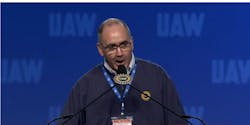With every passing hour, a United Auto Workers strike at the three Detroit-based automakers looks more and more like a sure thing.
The automakers—Ford, General Motors and Stellantis—are offering higher pay raises than in recent memory and a shorter time for newer workers to graduate from a lower wage tier to full-production wages. But it's not enough for the union leadership, whose membership is still clawing back from concessions made during the Great Recession amid record profits at the automakers and huge pay increases for CEOs.
Update: UAW Launches Triple Strike of Detroit Automakers as GM, Ford, Stellantis Contracts Expire
The plan is for the UAW to strike at midnight on Friday, September 15, with U.S. Sen. Bernie Sanders heading to Detroit to support newly striking workers at a downtown rally later that day.
Marc Robinson, a business strategy consultant who spent more than 30 years as an economist at General Motors and was involved in labor negotiations there, said despite the automakers improving their offers as negotiations that started in August continue, at this point a strike is inevitable.
“New union leadership has consciously taken a much more aggressive stance,” he said, an approach that “makes a lot of sense.” The union is fighting to both raise its profile nationally and regain credibility with its rank-and-file membership after a close UAW presidential election and, before that, an embezzlement scandal that put previous leaders in prison.
Striking selectively at plants at all three automakers simultaneously “is unprecented, but it makes sense,” as it would “minimize the drain on the strike fund and make [UAW President] Shawn Fain the most famous labor leader in the country,” while putting pressure on the automakers for an extended period of time.
Robinson added that he was surprised to see Ford CEO Jim Farley make a statement on Tuesday on eliminating the lower tier of worker wages. Farley was quoted in several publications telling reporters after a press event on Tuesday that Ford was offering: "Pay increases, elimination of tiers, inflation protection, five weeks of vacation, 17 paid holidays, bigger contributions for retirement.”
“To have a public statement on what was in their offer and to also talk about how he had been at the bargaining table, that's a very unusual thing to say,” Robinson said. “Once it's public that a company has offered to get rid of [the tiers], it makes it very hard for that not to be part of the final agreement.”
Eliminating wage tiers—aka placing new permanent hires on same the wage scale as legacy employees without a yearslong waiting period-- “is a particularly significant concession,” said Robinson “The companies fought very hard to get a two-tier wage [in 2008]. The union agreed to it at the time when the companies were in a lot of trouble. It allowed the companies to hire more workers and bring some work in that would otherwise have been done by suppliers.”
In subsequent contracts, the second-tier employment time period for new workers has decreased. “If they completely eliminate it, it's a major change, and that will have long-term repercussions,” said Robinson.
About the Author

Laura Putre
Senior Editor, IndustryWeek
As senior editor, Laura Putre works with IndustryWeek's editorial contributors and reports on leadership and the automotive industry as they relate to manufacturing. She joined IndustryWeek in 2015 as a staff writer covering workforce issues.
Prior to IndustryWeek, Laura reported on the healthcare industry and covered local news. She was the editor of the Chicago Journal and a staff writer for Cleveland Scene. Her national bylines include The Guardian, Slate, Pacific-Standard and The Root.
Laura was a National Press Foundation fellow in 2022.
Got a story idea? Reach out to Laura at [email protected]
